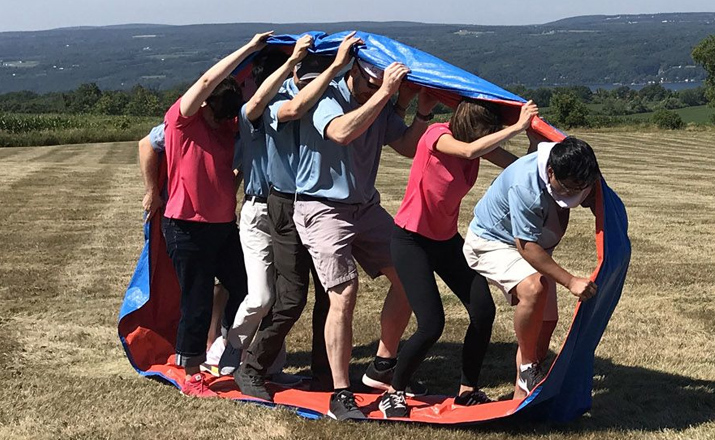Identifying Engaging Group Building Activities That Promote Problem-Solving Skills and Creative Assuming Among Colleagues
In today's rapidly developing work environment, cultivating problem-solving abilities and creative reasoning via team-building tasks has actually become essential for organizational success. Exploring these concerns can illuminate paths toward a much more vibrant team setting.
Understanding Group Building Benefits

In addition, group structure serves to enhance interpersonal relationships among coworkers, which is crucial for reliable communication. When employee create trust and relationship, they are more probable to share info honestly and seek assistance when needed. This synergy not just improves individual efficiency however additionally enhances overall team performance.
Additionally, group building activities can substantially boost spirits and inspiration. Employees that join interesting experiences feel much more linked to their company and are most likely to show raised commitment and efficiency. A motivated labor force is much better furnished to deal with troubles artistically and successfully.
Eventually, recognizing the advantages of group structure is necessary for organizations aiming to improve analytic abilities. By purchasing these tasks, companies can produce an extra natural, innovative, and durable workforce that is prepared to satisfy the demands of a dynamic business setting.
Attributes of Reliable Activities
Effective group building activities share numerous crucial attributes that improve their efficiency in establishing analytic abilities. To start with, they ought to foster cooperation amongst staff member, motivating open interaction and cumulative brainstorming. This joint atmosphere enables people to take advantage of diverse perspectives, which is crucial for innovative problem-solving.
Secondly, effective activities are developed to be challenging yet attainable, pressing individuals to believe seriously and artistically. These jobs need to require groups to browse barriers, analyze information, and create calculated remedies within a defined duration.
Another crucial characteristic is the element of representation (Orlando team building activities). Tasks that incorporate debriefing sessions make it possible for individuals to review their techniques, learn from successes and failures, and use these insights to future difficulties
In addition, successful tasks typically integrate real-world scenarios relevant to the team's job context. This not only improves involvement but additionally makes certain that abilities developed during the task are transferable to daily tasks.
Imaginative Problem-Solving Exercises
Imaginative analytical workouts play a crucial duty in improving a group's capacity to tackle complicated difficulties. These activities cultivate a setting where employee can assume outside package, encouraging innovative options via collaboration and diverse point of views.
One efficient exercise is the "Reverse Brainstorming" strategy, where individuals determine potential issues or challenges related to a task. By concentrating on what might fail, teams can design methods to reduce these problems and promote innovative thinking. One more beneficial exercise is the "Mind Mapping" approach, which permits staff member to visually Read Full Report organize their thoughts and concepts around a central style, assisting in connections and insights that may not emerge via conventional thinking.

In addition, the "Six Thinking Hats" method motivates individuals to method problems from different point of views, such as emotional, analytical, and imaginative point of views. This structured technique assists teams explore a selection of angles, resulting in thorough options.
Including these innovative analytical workouts into team-building tasks not just boosts cognitive versatility however also reinforces interpersonal partnerships, inevitably contributing to a much more cutting-edge and cohesive team dynamic. Such workouts are essential for cultivating a society of creative thinking and adaptability in the work environment.
Collaborative Difficulties for Teams
Various joint challenges can significantly improve a group's problem-solving capacities while promoting unity and interaction. These activities call for participants to take part in cumulative reasoning, cultivating an environment where you can find out more diverse viewpoints can be shared and valued.

In addition, group scavenger hunts can be created to incorporate particular analytic jobs that need tactical thinking and partnership. By involving in such difficulties, group members find out to browse disputes, create depend on, and value each various other's staminas. Orlando team building activities. Ultimately, collaborative challenges contribute in growing a natural group dynamic that flourishes on development and shared success
Determining Success and Results
To successfully assess the success of team-building tasks focused on boosting analytic skills, it is important to develop clear metrics and desired end results. This process starts with specifying particular objectives, such as improved collaboration, raised creativity, and boosted my review here crucial thinking among staff member. By expressing these goals, organizations can customize tasks that line up with their vision.
Measurable measures, such as pre- and post-activity surveys, can provide beneficial insights into individuals' assumptions of their problem-solving capabilities. In addition, tracking efficiency metrics-- such as project conclusion prices or the efficiency of services created throughout team-building exercises-- can show the influence of these tasks on total performance.
Qualitative assessments, including participant responses and observational research studies, can additionally enhance the examination process. Assisting in seminars post-activity allows groups to review their experiences, fostering a setting of constant enhancement.
Ultimately, gauging success is not just concerning examining prompt results yet additionally monitoring lasting behavior adjustments within teams. By continually reviewing the performance of team-building campaigns, companies can fine-tune their strategy, guaranteeing continuous development of analytical skills and innovative reasoning capabilities among colleagues.
Conclusion
Finally, choosing appealing team-building activities that cultivate analytical skills and innovative reasoning is important for boosting partnership among associates. Efficient exercises, such as Reverse Thinking and Retreat Area challenges, not just boost essential reasoning yet likewise promote a culture of imagination. By including real-world circumstances and reflective debriefing sessions, groups can enhance social connections and grow a resistant labor force, ultimately adding to cumulative success and enhanced business spirits.
Efficient group building fosters cooperation and boosts analytic capabilities within a company.Additionally, group structure tasks can dramatically enhance morale and motivation.Effective group building activities share a number of key features that boost their effectiveness in developing problem-solving abilities. By concentrating on what could go wrong, groups can develop approaches to minimize these concerns and boost imaginative thinking.In addition, team scavenger pursues can be made to include particular analytic tasks that require calculated thinking and partnership.